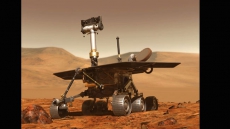Australian astronomers have developed a home-grown instrument based on bundles of optical fibres that gives the first 'Google street view' of the cosmos.
Developed by researchers at University of Sydney and Australian Astronomical Observatory, the optical-fibre instrument called SAMI can sample the light from up to 60 parts of a galaxy for a dozen galaxies at a time.
By analysing the light's spectrum astronomers can learn how gas and stars move within each galaxy, where the young stars are forming and where the old stars live.
Using the new instrument, astronomers have already spotted "galactic winds" - "streams of charged particles travelling at up to 3,000 km a second - from the centre of two galaxies.
"It is a giant step. Before this, we could study one galaxy at a time in detail or lots of galaxies at once but in much less detail. Now we have both the numbers and the detail," explained James Allen of the ARC Centre of Excellence for All-sky Astrophysics (CAASTRO) at University of Sydney.
In just 64 nights, the team has gathered data on 1,000 galaxies and over the next two years, it will study another 2,000.
The optical-fibre instrument was installed on the 4-m Anglo-Australian Telescope at Siding Spring Observatory in northwest New South Wales, Australia last year.
The researchers are also uncovering the formation history of galaxies by looking to see if they are rotating in a regular way or if the movement of their stars is random and disordered.
"There are hints that galaxies with random motions sit at the centres of groups of galaxies, where many smaller galaxies may have fallen into them," informed Dr Lisa Fogarty, a CAASTRO researcher at University of Sydney.





